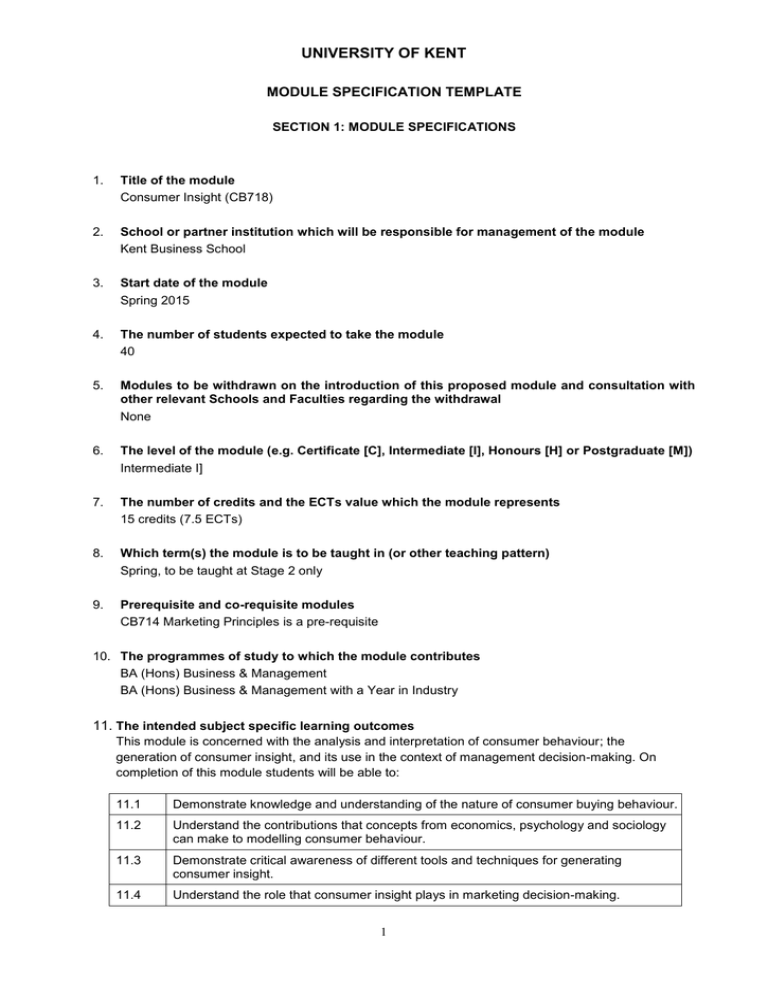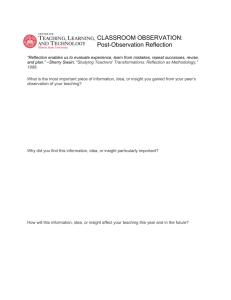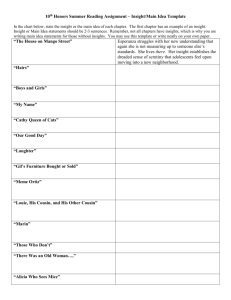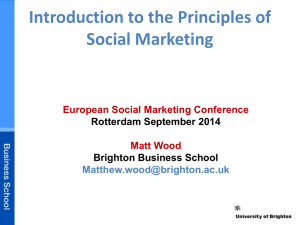Consumer Insight (CB718)
advertisement

UNIVERSITY OF KENT MODULE SPECIFICATION TEMPLATE SECTION 1: MODULE SPECIFICATIONS 1. Title of the module Consumer Insight (CB718) 2. School or partner institution which will be responsible for management of the module Kent Business School 3. Start date of the module Spring 2015 4. The number of students expected to take the module 40 5. Modules to be withdrawn on the introduction of this proposed module and consultation with other relevant Schools and Faculties regarding the withdrawal None 6. The level of the module (e.g. Certificate [C], Intermediate [I], Honours [H] or Postgraduate [M]) Intermediate I] 7. The number of credits and the ECTs value which the module represents 15 credits (7.5 ECTs) 8. Which term(s) the module is to be taught in (or other teaching pattern) Spring, to be taught at Stage 2 only 9. Prerequisite and co-requisite modules CB714 Marketing Principles is a pre-requisite 10. The programmes of study to which the module contributes BA (Hons) Business & Management BA (Hons) Business & Management with a Year in Industry 11. The intended subject specific learning outcomes This module is concerned with the analysis and interpretation of consumer behaviour; the generation of consumer insight, and its use in the context of management decision-making. On completion of this module students will be able to: 11.1 Demonstrate knowledge and understanding of the nature of consumer buying behaviour. 11.2 Understand the contributions that concepts from economics, psychology and sociology can make to modelling consumer behaviour. 11.3 Demonstrate critical awareness of different tools and techniques for generating consumer insight. 11.4 Understand the role that consumer insight plays in marketing decision-making. 1 UNIVERSITY OF KENT 11.5 Interpret statistical information relating to consumer behaviour, for the purpose of market segmentation and new product development. 12. The intended generic learning outcomes The following are the generic learning outcomes for this module: 12.1 Ability to select, organise and synthesise complex information. 12.2 Ability to undertake independent and self-managed learning. 12.3 Ability to propose solutions to problems based on analysis and discussion / debate. 12.4 Ability to communicate effectively through oral and written presentations. 12.5 Ability to communicate effectively within a group context. 13. A synopsis of the curriculum Consumer insight has become a key source of competitive advantage for businesses seeking to differentiate their products and services through a more precise targeting of specific consumer segments. The use of loyalty schemes that generate behavioural data of unprecedented detail has transformed the way in which consumer insight is generated and applied. This module explores this development and the way in which loyalty card data can be used in combination with traditional approaches to consumer research to generate unique behavioural insights that facilitate more effective marketing decision-making. The syllabus comprises the following core topics: 1. Introduction to consumer buying behaviour – disciplinary boundaries and environmental contexts 2. The relationship between buyers and consumers – distinguishing between the purchase decision and the consumption decision 3. Influences on the consumer as a purchaser – internal (perceptions and attitudes) and external (promotions, advertising and the retail environment) 4. Modelling consumer behavior – conceptual, theoretical and methodological frameworks 5. Generating consumer insight – data collection 6. Interpreting consumer insight – data analysis 7. Applying consumer insight - linking theory with practice 8. Ethical issues in the generation and use of consumer insight 14. Indicative Reading List The core text for this module is: Stone, M., Bond, A. & Foss, B. (2005). Consumer Insight: How to use data and market research to get closer to your customer’, London: Kogan Page The following texts will provide useful background reading: Smith, B. & Raspin, P. (2008). Creating market insight: how firms create value from market understanding’, New Jersey: John Wiley & Sons Malhotra, N., Birks, D. & Wills, P. (2013). Marketing Research: An Applied Approach, London: Pearson. Sorensen, H. (2009). Inside the mind of the shopper: the science of retailing, London: Prentice Hall Humby, C., Hunt, T., Phillips, T. (2007), Scoring points: How Tesco continues to win customer loyalty, London: Kogan Page. Schiffman, L. and Kanuk, L. (2011), Consumer Behaviour, 10th Edition, London: Pearson. Evans, M.M., Foxall, G. and Jamal, A. (2009), Consumer Behaviour, 2nd Edition. London: Wiley. 2 UNIVERSITY OF KENT East, R., Wright M., Vanhuele, M. (2008). Consumer Behaviour: Applications in Marketing, London: Sage. Hoyer, W.D. & MacInnis, D.J. and Pieters, R. (2012). Consumer Behaviour, 6th Edition, Ohio: South-Western Cengage Additional reading will be recommended from journal articles to be published in the module guide. Such reading will provide the intellectual platform for the module beyond the lecture series. The following journal articles are an example of the selective readings that will form the basis of seminar discussions: Voss, Kevin E., Spangenberg, Eric R. and Bianca Grohmann B. (2003). “Measuring the Hedonic and Utilitarian Dimensions of Consumer Attitude,” Journal of Marketing Research, Vol. XL (August), 310-320. Mittal, Banwari. (1995). “A Comparative Analysis of Four Scales of Consumer Involvement,” Psychology & Marketing, Vol. 12(7), 663-682. Gourville, John T. (2006). “Eager Sellers and Stony Buyers: Understanding the Psychology of New Product Adoption” Harvard Business Review, June, 98-106. Scientific Journals: Journal of Consumer Behaviour Journal of Consumer Research Journal of Marketing Channels Journal of Consumer Marketing . 15. Learning and Teaching Methods, including the nature and number of contact hours and the total study hours which will be expected of students, and how these relate to achievement of the intended module learning outcomes: The module will be delivered using two different modes of teaching and learning: lectures and seminars. The objective of the former is to introduce formally the conceptual theoretical and methodological components of the course. Seminars are designed to encourage active learning and peer-based methods of learning, with students working in groups, role playing and providing feedback to each other on key learnings and areas for improvement in both content and delivery. In both lectures and seminars time is given for comment and questions. Hours Subject LOs Generic LOs Lectures 11 11.1 – 11.5 12.3, 12.4 Seminars 10 11.1 – 11.5 12.4, 12.5 Preparation for seminars 40 11.1-11.5 12.1-12.3 Preparation for exam 40 11.1-11.5 12.1-12.4 Independent study 49 11.1 – 11.5 12.1 – 12.2 Total hours 150 3 UNIVERSITY OF KENT 16. Assessment methods and how these relate to testing achievement of the intended module learning outcomes The module is assessed by a combination of examination (60%) and coursework (40%). The coursework consists of two elements: a) an online Moodle test (one-hour), covering the first half of the course (20%) b) a group project, with students working together in groups of up to five people ,comprising a written report (3,000 words) on the interpretation of consumer behaviour data from a variety of statistical sources (20%) Additionally there will be a two-hour, closed book end-of-year examination (60%). Weighting Subject LOs Generic LOs End-of-year examination (two-hour, closed book) 60% 11.1 – 11.4 12.1 – 12.4 Online Moodle test (one-hour) 20% 11.1 – 11.5 12.1 - 12.3 Group project with written 20% 11.1 – 11.5 12.1- 12.5 report (3,000 words) 17. Implications for learning resources, including staff, library, IT and space Staff time for the teaching hours outlined above. Library resources should be sufficient for the indicative reading; lecturing and seminar facilities. There are no specific IT requirements for this module beyond the usual module website for module material. 18. The School recognises and has embedded the expectations of current disability equality legislation, and supports students with a declared disability or special educational need in its teaching. Within this module we will make reasonable adjustments wherever necessary, including additional or substitute materials, teaching modes or assessment methods for students who have declared and discussed their learning support needs. Arrangements for students with declared disabilities will be made on an individual basis, in consultation with the University’s disability/dyslexia support service, and specialist support will be provided where needed. 19. Campus(es) where module will be delivered: Medway SECTION 2: MODULE IS PART OF A PROGRAMME OF STUDY IN A UNIVERSITY SCHOOL Statement by the School Director of Learning and Teaching: "I confirm I have been consulted on the above module proposal and have given advice on the correct procedures and required content of module proposals" ................................................................ .............................................. Director of Learning and Teaching Date ………………………………………………… Print Name Statement by the Head of School: "I confirm that the School has approved the introduction of the module and, where the module is proposed by School staff, will be responsible for its resourcing" 4 UNIVERSITY OF KENT ................................................................. .............................................. Head of School Date ……………………………………………………. Print Name Module Specification Template Last updated February 2013 5




